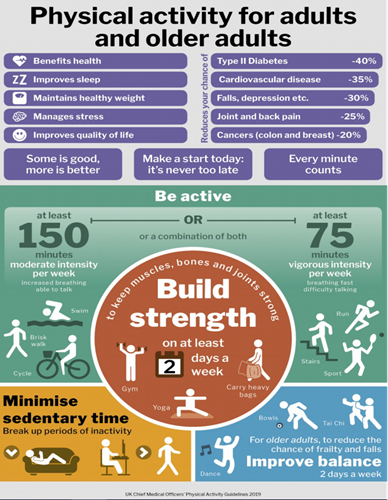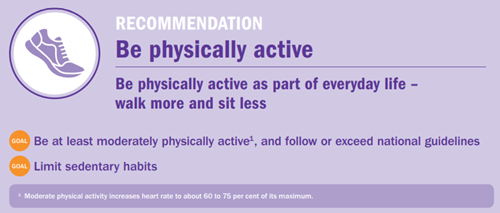Exercise & Cancer
Georgina Connor, Live Life Fitness Instructor, is a:
- Level 4 Cancer, Neurological and Mental Health Specialist
- Level 3 GP Exercise Referral and Personal Trainer
- Pink Ribbon Pilates Instructor
- Pre/Post Natal Instructor
Introduction
When it comes to cancer and physical activity, the advice always used to be ‘rest up’, but this isn’t the case anymore. Yes, you should rest, but if you can manage any type of movement, however small, it will certainly help you feel better. Don’t beat yourself up if your body isn’t up to it. We know even getting out of bed can be a big achievement on certain days. But if you’re stuck in bed try lifting a leg or waving your arms in the air, because any bodily movement can bring benefits.

What is Physical Activity?
Physical activity is classed as any bodily movement produced by skeletal muscles that requires energy expenditure. So, to put it simply, any type of movement that takes up energy. The benefits of physical activity are well documented, but here’s a reminder of some of the changes you might hope to see:
- sense of control over your life,
- increased energy levels,
- decreased anxiety and depression,
- improved quality of life,
- increased bone strength,
- improved endurance for daily activities,
- improved heart strength,
- improved muscle strength and endurance,
- increased life expectancy,
- lower risk of reoccurrence.

What should I do?
There are various opportunities and resources to help you start (and hopefully stay!) being active on island. Initially, you should let your GP or a health professional know that you’d like to start/continue being active throughout your treatment when possible. At this early stage, it’s best to seek advice from a specialised Level 4 Cancer Rehabilitation Specialist, which basically means a personal trainer who has a qualification and experience of working with participants with a cancer diagnosis.

Where do I go?
Live Life Fitness (livelifefitnesscoach@outlook.com) are funded by cancer charities such as Breast Cancer Support Jersey, Friends of Jersey Oncology (FOJO) and Macmillan Cancer Support Jersey. They run specific cancer exercise classes. Macmillan also offer their own classes, these have included yoga, Tai Chi and Pilates. The calendar on the Oasis page of
Once you’ve reached a point where you don’t need specific cancer support while exercising, there are lots of gyms, clubs and personal trainers in Jersey who will be able to help you remain active, as well as a company called Move More Jersey that runs various activities to help you stay active.

Things to remember
Everyone’s exercise journey will look different, but here are some general tips to keep in mind.
- When exercising, participants need to wear their compression leggings or sleeve if it has been prescribed post lymph node removal, this will allow lymph fluid to filter.
- Allow adequate time to heal post operation – you’ll need to be cleared for exercise from your surgeon, nurse or doctor post-surgery.
- When exercising you should focus on wearing loose, lightweight clothing that you’re comfortable in.
- If it’s cold outside, wear layers that can be removed.
- Depending on the type of exercise you may need trainers to protect your feet from resistance equipment.
- Remember to take any medication that you have been prescribed, like GTN spray for angina or inhaler for asthma.

What is the F I T T principle?
In the sport, exercise and physical activity industry, there is a FITT principle that stands for Frequency, Intensity, Time and Type that directs what’s advised.
Frequency (how often should you exercise per week?): Ideally every day or whatever you can manage. The recommendation is at least 150 minutes per week.
Intensity (how hard should you work for health benefits?): Moderate-intensity aerobic physical activity. During exercise, you want to feel the stretch of scar tissue however, not force the stretch. You want to feel the muscles working but not over doing it. On your first time, I would start slow as you can always build on what you did last time.
Time (how long for?): At least 150 minutes of moderate-intensity aerobic physical activity throughout the week. Aerobic activity should be performed in bouts of at least 10 minutes.
Type (of activity?): I would recommend doing an activity that you enjoy whether that be walking, exercise classes or anything type that raises your heart rate.
Muscle-strengthening activities should be done involving major muscle groups on 2 or more days a week.
If you want to read more about our recommendations for cancer patients, this is very helpful: Cancer PA Recommendations.pdf

General Activity Guidance for Adults
UK Chief Medical Officers' Physical Activity Guidelines 2019



